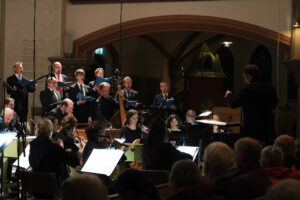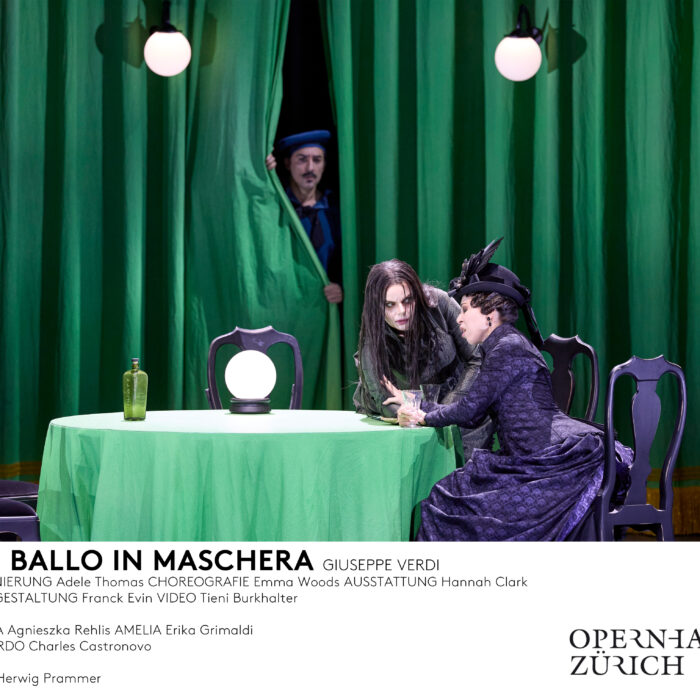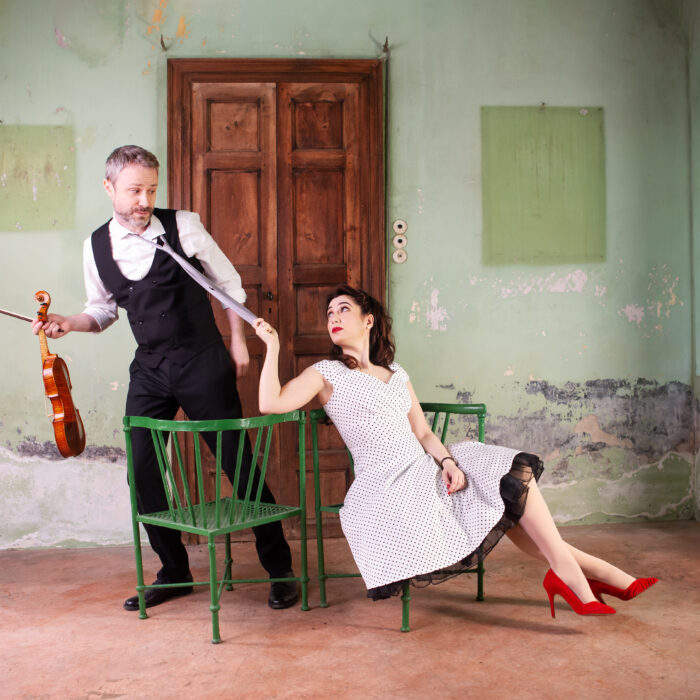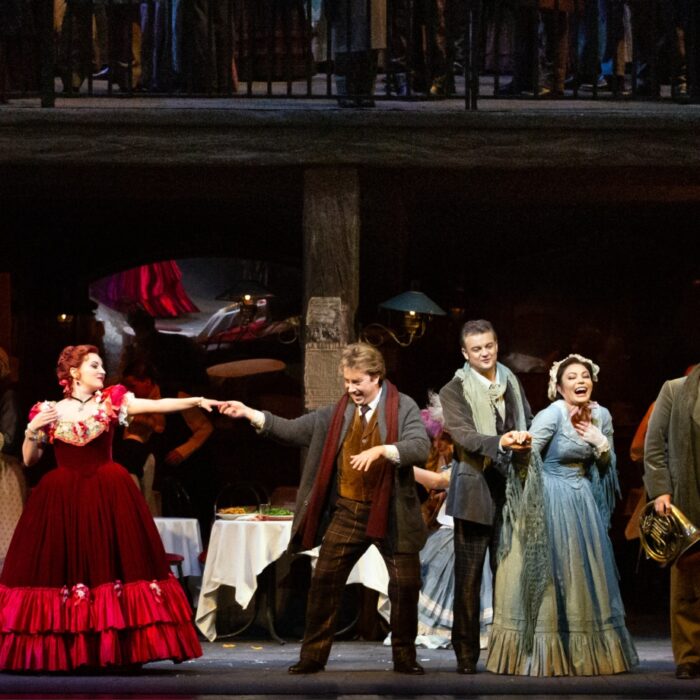
Swedish Radio Choir Review 2023: Awake! Hear The Voices Calling
By John VandevertFew things inspire one to brave the winter cold, most specifically the inner city wind with its biting apathy and fierce animosity towards exposed skin and flesh. However, during the early afternoon on November 25th, one might have felt especially moved to brave the unforgiving temperatures in downtown Stockholm for the Swedish Radio Choir‘s performance of two of J. S. Bach’s most beloved works. Within the grand sanctuary of Oscar’s Church, a cool thirty minute walk from downtown Stockholm, home to one of Sweden’s most famous organs built in 1949 by the Marcussen & Søn company, cantata BWV 140 “Wachet Auf, Ruft Uns Die Stimme” and BWV 236 “Mass in G Major” were performed. Two of my favorite pieces by Bach, the night was full of fulfilled expectations and beauty.
Accompanied by a sagacious chamber orchestra consisting of a slide trumpet, in Swedish, dragtrumpet, an instrument of rich musicological debate, organ, harpsichord, and a healthy dose of strings and woodwinds, the transcendent harmonies of Bach’s music so rightfully deserved to fill the space. As an audience member mentioned prior to the concert’s beginning, one was to bear witness to a choir singing in unbreakable unity, and indeed that’s what unfolded with exceptional precision and clarity. All was made whole with the introduction of the soloists.
An Evening of Art
The evening’s musical festivities were directed by Fredrik Malmberg, a renowned conductor and master of dynamics and phrasing, although his penchant for musicality was at times far more than needed. Acting as the conduits for Bach’s sonorous philosophizing were several soloists from the choir’s ranks, both advantageous and limiting it seemed. For the first half, tenor Magnus Wennberg, soprano Kathrin Lorenzen, and baritone Lars Brissman faithfully executed their musical duties with elegance and grace, a slight reservation given to Lorenzen who, all too often, clipped the line and utilized senza vibrato to a fault.
Other irking moments included Brissman’s execcessive gesticulations and attempted interactions with Lorenzen despite its deeply rich voice doing enough on its own. The evening’s second half was led by baritone Karl Söderström, soprano Eleonora Poignant, mezzo-soprano Anna Graca, and baritone Carl Unander-Scharin, all phenomenal at realizing Bach’s notoriously challenging rhythms and register movements.
One often does not speak enough of the choir in reviews, but the synergy and intuition in critical moments of this choir, from apexes of high tension and contrapuntal complexity to melodic reverence and sacred austerity, effectively conveyed the message Bach spent years attempting to convey time and time again. On top of that, despite the weather, the cathedral was packed! The floor and the wrapped balcony were full of eager spectators, all waiting to bear witness to repertoire which defied both the evening’s weather and our world’s sorry state.
Making the concert even more multi-sensorial were the bell tolls prior to the start. Although an even more “accurate” performance would entail haphazard rehearsals (if any!), singers who barely knew their music and who most likely were sick or rather fed up, and an audience unreceptive of Bach’s ostensibly antiquated musical vision. Historical accuracy aside, the Bach performed for this was, dare one say, the consummate expression of the Bachian ideal: Pious service through music to one Lord.
A Bit of Faithfulness and Creativity
The first and second half were both like choral and solo masterclasses in the art of singing Bach. Whether it was the balanced constancy of the choir’s regulated burn or the soloists’ nuanced approach towards ornamentation and dynamic phrasing, one might have been pleasantly surprised. The musicians focused on bringing the composer’s vision to life rather than their own. Both BWV 140 and 236, contrasting takes on sacred musicality, were performed nearly perfectly, and were wonderful compliments to each other.
Speaking of artistic selflessness and near perfect execution, “Wachet Auf” was eloquently performed from its beginning to its richly congregational choral ending. The celebrated opening chorus, a youthful glorification of the soul’s divine marriage to the one true God, performed with such gaiety and merriment that one might have seen the pleroma light itself. Practically speaking, every melodic contour had a purpose, driven by something obviously from within the mind’s eye of singer and instrumentalist alike. The unspoken element, which takes a performance from good to great, floridity was not superfluous but the opposite. This was a tribute to the highest ideals written in the language of music, a vocabulary undoubtedly native to the evening’s soloists.
Wennberg, being the evening’s first soloist, masterfully spoke with weightless sophistication, putting to shame his brief moment in the spotlight. Erudite diction was a recursive theme throughout the night, Wennberg’s a benchmark of perfection. Lorenzen and Brissman’s duet, musically embodying the soul and the vox Christi respectively, were a sublime mixture of punctiliousness and elocution. With Brissman’s paternal and stoic warmth partnered with Lorenzen’s spotless color, the flickering flames of Bach’s siciliano galant and intrepid naturality was conveyed supremely well. Similar to the playfulness between lovers, one might have found themselves smiling quite a lot.
Following another well sung chorus, Brissman’s recitative was a welcomed break from the effulgence prior. Taking a rather slow tempo, perhaps too slow, Brissman sensitively conveyed the unfolding union between us and God with all the reference so required by the Bachian interpreter. The following duet with Lorenzen, a blissful union in its own right, had the bounce and sprightly color fit for a revelry between divine lovers. The final chorus was deeply moving, as it should be, and was met with a silence charged with attentiveness.
The mass continued the evening’s perceptive negotiation of artistry and authorial faithfulness. The four soloists conveyed both their individual skills and adept reading of the Bachian vocabulary. The first two movements were sung with grace and dignity, aesthetically contrasting the first half but maintaining the levitative, spacious quality for which Bach’s music calls for and demands. The internal logic of Bach’s music was conveyed with tact and personality by the chorus, another theme of the evening’s second half. Söderström effectively sang the first solo, a handsome and deeply sophisticated performance. His florid passages were clean and a beautiful consistency permeated his voice. He demonstrated all the signs of a true master of his craft.
The following duet between Poignant and Graca was a sumptuous pairing of complimentary timbre and color. Poignant’s bell-toned voice occupied the skies of Graca’s enlightened resonance. At times, Graca was far too quiet and it became rather challenging to hear her. The final solo by Scharin was supreme, the Bachian tour de force on par with BWV 248 “The Christmas Oratorio” and its extremely arduous negotiations of technique, artistry, and breath. Scharin’s rhythmic conscientiousness was never at the expense of technique, the regular movements through his upper passaggio done with refinement and dexterity.
Of course, there were elements in need of improvement, like all things. During the duets between Lorenzen and Brissman, Lorenzen often employed straight tone at the beginning of held notes, trimmed her phrases prematurely, and was rather excessive with her usage of subito dynamics. She also lacked legato in comparison to Brissman, causing her singing to be segmented and without the bel canto bliss we are used to in early music. Whether it’s accurate or not, lack of vibrato is offensive to ears trained on operatic bel canto which is to say the majority of the evening’s audience, although one can’t be too sure of these things.
Further snags included Malmberg’s routine overemphasizing of dynamics and mezza di voce were tiresome by the end, causing the mass to be somewhat lopsided and without the constancy one might had hoped for. Nevertheless, the evening was very enjoyable and to the unexperienced in the Swedish early music scene, one might have been pleased they braved the cold. The Swedish Radio Choir obviously knows what they are doing and with a polishing, their interpretation of Bach could soar more than it already had. The sublime can only be improved so much.
Categories
Reviews

